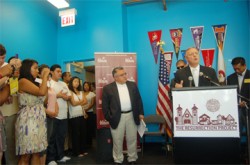By: Ashmar Mandou
 In less than a week, hundreds of undocumented immigrants will descend upon Chicago’s Navy Pier to apply for a work permit through the Deferred Action for Childhood Arrivals policy, introduced by President Barack Obama’s administration in June.
In less than a week, hundreds of undocumented immigrants will descend upon Chicago’s Navy Pier to apply for a work permit through the Deferred Action for Childhood Arrivals policy, introduced by President Barack Obama’s administration in June.
As interest in the policy continues to build, U.S. Senator Dick Durbin and Representative Luis Gutiérrez joined together for a press conference Tuesday at the Resurrection Project in Pilsen to warn the undocumented community against lawyers who are charging high fees to help interested parties. “There are notarios as well as attorneys out there who are trying to take money away from these young people and their families,” said Durbin.
The issue was brought to light when Gerardo, 25, was asked by two Chicago attorneys to pay up to $2,000 in exchange for collecting his paperwork and submitting it to the federal government. “I was surprised when they told me the fee amount,” said Gerardo. “So I decided to get a third opinion.” Gutiérrez, along with Durbin and Lawrence Benito, chief executive officer of the Illinois Coalition for Immigrant and Refugee Rights (ICIRR), assured the undocumented community that obtaining a lawyer is not necessary to filing an application under the new policy. “To follow in Gerardo’s footsteps, everyone will get a third opinion come August 15,” said Gutiérrez.
Gutiérrez referenced ICIRR’s Dream Relief Day to be held next Wednesday at Navy Pier. There, undocumented youth will be able to receive one-on-one consultations with lawyers free of charge as well as receive assistance in filing the application. Currently, there is a fee of $465 to be paid to U.S. Citizenship and Immigration Services, the agency accepting the applications. The application, which allows qualified youth to stay and work without fear of deportation for two years, will be released on August 15 and is anticipated to reach 1 million undocumented youth across the country.
To qualify for the Deferred Action for Childhood Arrivals undocumented youth must meet five criteria to qualify for deferred action: they must have come to the U.S. before they turned 16; they must have been born after June 15, 1981; they must have continuously resided in the U.S. since June 15, 2007, and must have been present in the U.S. on June 15, 2012; they must currently be in school, have received a high school diploma or GED, or been honorably discharged from the U.S. Armed Forces or the Coast Guard; they must not have been convicted of a felony, a “significant misdemeanor,” multiple misdemeanor offenses, or otherwise pose a threat to national security or public safety. Anyone applying for deferred action would need to go through a criminal background check.
It’s also important to note that this new policy does not provide a path to citizenship nor is it a part of the DREAM Act, which Durbin has pushed for the last ten years. Simply, the Deferred Action for Childhood Arrivals allows passage for those under the age of 31 to seek job opportunities without the risk of deportation for two years. After the two years, applicants must reapply. “This new policy is a small step towards immigration reform,” said Gutiérrez. “It’s incumbent upon us, now that we’ve got this, to move on to their moms and their dads. Comprehensive immigration reform is what is necessary and that’s what we’re going to work on next.”
Congressmen Gutierrez and Durbin, along with ICIRR, and Mayor Rahm Emanuel, will be on hand August 15 for DREAM Relief Day at Navy Pier’s Grand Ballroom from 9a.m. to 2p.m. Currently, ICIRR created www.dreamrelief.org for families to track the latest news and processes for DREAM Relief Day. Also, visit the U.S. Citizenship and Immigration Services, www.uscis.gov/howdoi to learn more about the Deferred Action for Childhood Arrivals.










